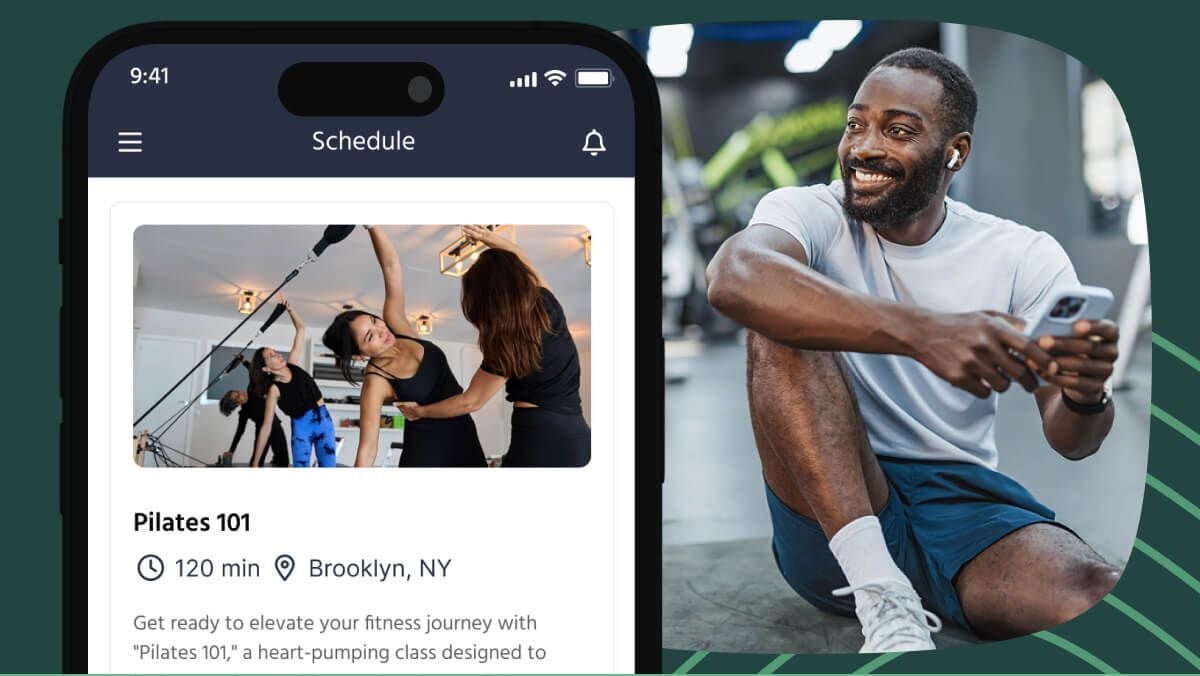Are you a commercial gym owner hoping to make up for lost memberships or an aspiring personal trainer wanting to start their own business?
Then creating a mobile gym is the perfect way to get into the fitness industry and share your enthusiasm for health and well-being.
But don't be fooled - this endeavor requires dedication, thoughtfulness, and awareness of laws in your state or country.
This article will cover all these aspects of mobile gym ownership so that you can launch a successful business with plenty of clients.
With the proper knowledge and support system behind you, there's no limit to how far your mobile gym business can go. We'll discuss each topic in detail in the following sections, so let's get started!

What is a mobile fitness business?
Generally, mobile fitness businesses include personal training programs; however, you can also add small group classes in apartment complexes or community centers.
Rather than your customers going to the gym with you, take the equipment and coach them! There are plenty of reasons individuals would instead work out at home alone:
- A hectic lifestyle.
- Lack of transportation options.
- Even wanting to avoid gyms due to current health safety measures.
Regardless of their motivations - give your clients what they need on location!
What are the benefits of operating a mobile gym business?
The mobile fitness industry is rapidly growing, and the potential rewards of a mobile gym business can be fantastic.
Not only will you have total control over your hours and pricing - but you'll have the freedom to work in any location and with any equipment. Plus, mobile gyms tend to attract more clients due to their convenience!
You're not limited to the gym, so you can easily customize your mobile fitness business to any location and budget.
Furthermore, mobile gyms have a lower overhead cost than traditional facilities - meaning more of your profits will stay in your pocket!
Whether you're starting or are an established trainer looking for new opportunities, read on to learn more about mobile gyms and the process of setting one up.

Grasping the fundamentals of the business
As a mobile gym owner, having the insight to distinguish both the benefits and drawbacks of your business and potential possibilities for growth and risks that could prevent progress is essential for success.
These will help you better understand the mobile gym industry and how to operate yours effectively:
Strengths of mobile gyms
-
Low overhead costs compared to traditional gyms
-
Flexibility to operate and customize mobile gym services in any location
-
Increased convenience for customers since they can work out from the comfort of their own home
-
Ability to offer smaller group classes or individual sessions
Weaknesses of mobile gyms
-
Limited access to gym equipment and machines for mobile gyms
-
Difficulties in marketing a mobile gym business due to its physical limitations
-
Possible disruptions from weather or other external factors that can impact the quality of mobile gyms services
Opportunities for mobile gyms
-
Ability to offer specialized services based on customer preferences
-
Scope for experimentation with different formats like virtual training sessions, small group classes, etc.
-
Expansion into a larger mobile franchise with higher profits potentials
Threats for mobile gyms
-
Competing against traditional gyms with larger budgets and bigger market share
-
Changes in customer preferences that could affect mobile gym businesses
-
Outdated mobile equipment reducing customer satisfaction
-
Potential business disruption due to unforeseen external factors like weather, pandemics, etc.
Discover 12 steps to kickstart your mobile gym business
Now that you have a big-picture understanding of the mobile gym business model, it's time to start the research and planning process.

You'll need to collect all the necessary information to make your mobile gym business a success - from researching laws in your state, getting insurance, and gathering equipment. Let's dive into these steps for building your mobile fitness business.
Determine who your target market is
Research your market and potential customers. Try asking these questions to yourself:
-
Who are you targeting?
-
What's the demand in your location?
-
What kind of mobile gym services will they be looking for?
An understanding of the needs of local customers is essential to create an effective mobile gym service that meets their requirements.
For example, suppose you have mobile gym clients looking for specialized services like yoga classes or boot camps.
In that case, you must ensure that your mobile gym business has the necessary equipment and trainers with the right qualifications.
Additionally, understanding customer preferences regarding location, time of day, and other factors can help you plan accordingly to meet their needs best.
Conduct comprehensive research into the legalities
Before you pursue your dreams of establishing a mobile gym business, take the time to understand which license requirements are mandatory in your state.
Additionally, since you don’t have a corporate backbone supporting you in this endeavor, be prepared to handle taxes and insurance independently.
The success of your venture may hinge on how well-informed you are about what regulations you must meet before setting up shop - so do research now!
Get the right insurance
Whether training clients at the gym or in their homes, you must invest in insurance to protect yourself. Numerous policies covering gyms and personal trainers are available on the market.
Ensure your policy covers mobile business and home sessions when shopping for coverage.
Also, remember that car insurance rates can vary depending on how often you use it for business purposes; thus, consult with an experienced provider and compare quotes until finding what best fits your needs!
Develop a brand identity
To stand out from the competition, create a unique visual identity for your mobile gym business by designing an eye-catching logo and website.
Decide what makes it stand out from other mobile gyms or traditional gyms, decide on a name and logo, choose colors and fonts, and create an online presence to help your mobile gym business build a recognizable identity.
Gather and clean your equipment
Make sure you have enough mobile fitness equipment to cater to all kinds of workouts. Consider investing in quality products that offer value and a good user experience.
Depending on the objectives of your customers and the training approaches you use, the equipment required can vary significantly.
Fortunately, your clients can do many exercises successfully with just a few items, such as kettlebells, resistance bands, dumbbells, or agility ladders.
Furthermore, some clients may have their own exercise gear, which they'll bring to sessions, making life easier!
And finally, you must thoroughly clean and disinfect your equipment between clients to ensure that sweat, grime, and irritants such as pet hair are entirely removed. This way, it is safe for all your customers to work with the same tools - no matter where they are!

Be organized with your scheduling
To ensure that you stay on top of your client's training schedules, take the time to correctly record each scheduled session in either gym software with an appointment system or another app entirely.
Remember to include their home address and personal information with every entry for accuracy; once you arrive at the correct house, you'll be able to provide personalized service!
Furthermore, plan for additional time between sessions to give your client a professional experience.
We all know how unpredictable traffic can be, so if you think it will take 30 minutes to get from one house to the next - add an extra 15-20 minutes buffer to be safe! In case of delays, remember that communication is vital.
Let your client know as soon as possible, so they are aware and not left wondering what happened or when you'll arrive.
Set a cancellation policy and enforce it when you have already taken the time (and mileage) to visit your clients. Request confirmation of appointments 24-48 hours in advance, as most people are willing to confirm quickly via text message.
Remember that housekeeping and administrative tasks require your attention, too - such as billing, marketing emails, and programming workouts - so make sure they are accounted for in your schedule.
Ensure your transportation is well maintained
Opting for a mobile business means you don't need to worry about having a gym space but rather ensuring reliable transportation.
After all, your success depends on being able to travel with equipment and arrive promptly. As such, always make sure to have a backup plan just in case car issues arise!
Additionally, it is essential to keep up with regular vehicle maintenance and ensure there's enough gas in the tank; this will ensure professionalism and punctuality when clients hire you.
To ensure your equipment stays in top condition, take it out of your vehicle when you're between jobs if you live in a climate with scorching summers or freezing frigid winters.
If car trouble strikes at an inconvenient time, let customers know immediately to keep them informed and understand any delays caused by unexpected mishaps.
You'll need an appropriate and organized system to safely and conveniently transport your equipment.
When storing items in the trunk of your car, containers, and organizers are essential to preserving order within the space.
Who wants to travel with a free-rolling kettlebell back there after all? Investing in storage solutions will save you time and energy and possibly prevent any damage caused by misplaced items!
Understand payment options
Decide how clients can pay for mobile gym services - if they're paying in cash or card, and what payment processing methods are available to them (e.g., Square or PayPal).
Ensure that there are no hidden fees with the payment processor that might reduce your profits.
Spend more time on personalization
Working with a single or small group of clients at each session enables you to customize every workout based on their individual objectives.
This is why people pay for personal training - they want an experience tailored to them.
Of course, customizing workouts requires more time spent preparing and developing programs for those different needs. Nevertheless, this commitment will be rewarded when your clients see (and feel) the results!
Be creative with your marketing
Reaching potential customers through traditional marketing methods can be challenging with no physical location. Yet there are still many opportunities for a virtual gym, the most prominent of which is social media!
Create pages for your business and post regularly with high-quality photos and videos that showcase clients' successes (with their permission). Tag them so they can help spread awareness by sharing with friends - you might even gain some new members in the process!
Moreover, direct all inquiries to your website for complete information about what you offer. Include the details of your mobile business, the type of training available, and how clients can schedule a session or consultation.
With this added convenience, customers will be encouraged to book with ease.
Learn more: 30 gym marketing ideas
Keep track of finances
To maintain a streamlined payment system and stop chasing down payments for individual sessions, you should set your clients up with an advanced session scheduling plan.
By requiring that they pay at the start of each month, you also guarantee more reliable attendance, as participants have already paid for their session(s). This way holds true no matter how many training plans (e.g., 3x per week) you offer!
Make sure to employ a bookkeeper or gym software that gives you timely notifications when payments are neglected, so your accounts receivable can stay current. This will save you the time of manually tracking each transaction.
Additionally, remember to document your mileage for tax purposes! Several smartphone applications utilize GPS and transform all the data into an easy-to-manage spreadsheet; these apps make tracking miles traveled effortless.
Get involved in building a vibrant and supportive community
How to build a fitness community
Participate in online forums, chat groups, and events to get your name out there. This will help you increase visibility and grow a network of satisfied customers who will recommend you to others.
Moreover, take advantage of your best marketing strategy - get more leads and referrals from your current clients! Ask them to spread the word about your mobile gym business.
Additionally, you can donate free training sessions to charitable organizations and host complimentary workouts during festivals or events.
This will give people in the community a chance to try out what you offer for free, increasing your brand's visibility and leading more potential customers through the door!
Finally, providing opportunities for your clients to communicate and connect can be beneficial.
By establishing groups on social media where they can interact and share helpful fitness secrets and successful client stories, you'll foster an environment of community support that will undoubtedly lead to more positive results.
Frequently asked questions on mobile gym business
What is a mobile gym business?
A mobile gym business is a fitness business that provides training sessions in the comfort of clients' homes. The mobile trainer brings all the necessary equipment and can even provide nutrition advice with each session.
What do I need to start a mobile gym business?
To start a mobile gym business, you need to research the laws in your state, obtain liability insurance, gather any necessary equipment, and find your target market. It would be best if you also created a brand that resonates with potential customers and understands payment options for collecting payments from clients.
What do you need for a gym business?
For a gym business, you need to have a variety of fitness equipment, professional certification, liability insurance, and marketing materials such as a website or business cards. You also need to understand the laws and regulations of operating a gym in your jurisdiction. Additionally, you'll need to develop payment processing systems for clients and figure out how to promote your services.
How do you attract clients to the gym?
You can leverage various strategies to bring new clients to your gym. Offer complimentary classes and promotional events for an initial buzz about your business, implement social media advertising and local newspaper ads to spread the word further, develop content-rich digital marketing campaigns that captivate potential customers, and don't forget to contact them directly!
How do you manage a gym business?
Managing a gym business requires an organized and efficient approach. You must create a budget, develop marketing strategies, hire trainers that meet your standards, and stay up-to-date on industry trends. Additionally, you should strive to build relationships with clients and create programs tailored to their needs. Finally, make sure to track performance metrics to measure the success of your gym.
What type of business structure is a gym?
A gym business can be structured as a sole proprietorship, partnership, LLC, or corporation. Sole proprietorships and partnerships are the simplest forms of business structure since they require minimal paperwork and setup costs; however, these entities provide no personal liability protection for owners. LLCs offer more flexibility than traditional corporations while still providing limited liability protection. Corporations are the most complex structure, but they provide shareholders with limited liability protection and can help attract investors.










